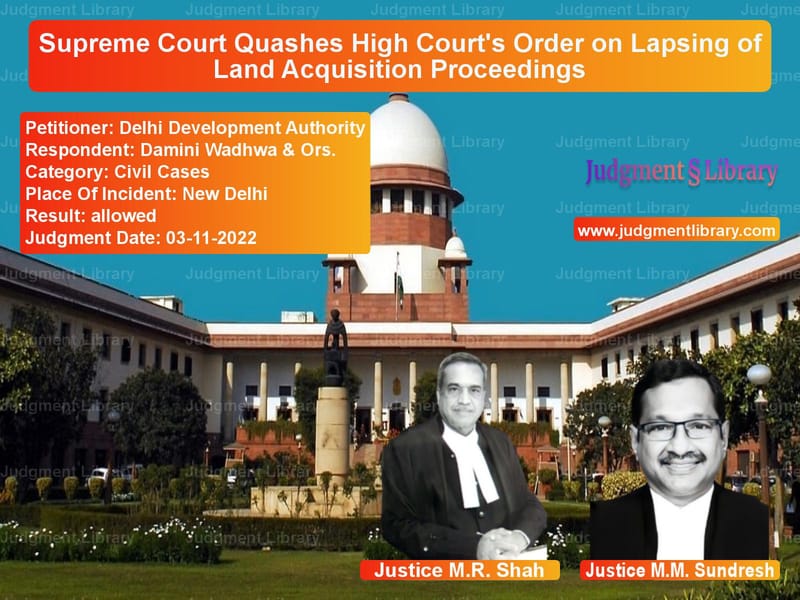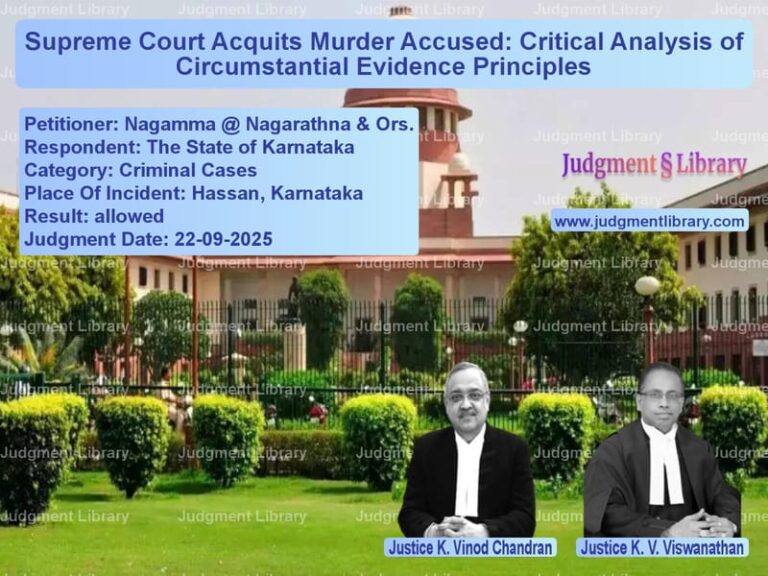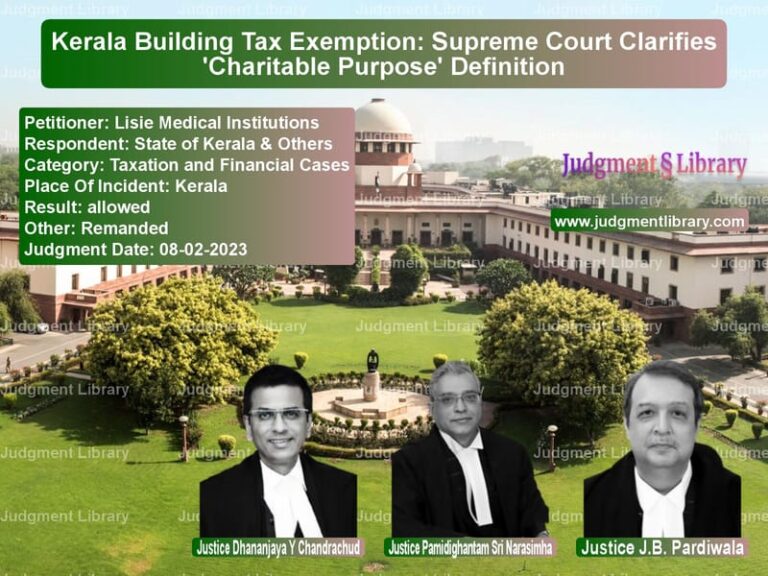Supreme Court Quashes High Court’s Order on Lapsing of Land Acquisition Proceedings
The Supreme Court of India recently addressed a significant case involving the Delhi Development Authority (DDA) and a private landowner, Damini Wadhwa, in a dispute over the lapsing of land acquisition proceedings under Section 24(2) of the Right to Fair Compensation and Transparency in Land Acquisition, Rehabilitation and Resettlement Act, 2013 (the Act, 2013). The case revolves around the acquisition of agricultural land in the village of Maidan Garhi, Delhi, and the question of whether the acquisition had lapsed due to non-payment of compensation and non-taking over of possession by the authorities.
The Delhi Development Authority (DDA) challenged the High Court’s decision, which ruled that the acquisition of the lands in question had lapsed under Section 24(2) of the Act, 2013. This provision allows for the deemed lapse of an acquisition if either compensation has not been paid or possession has not been taken within five years of the award declaration. The High Court had declared the acquisition to have lapsed because the compensation had not been paid and possession had not been taken for certain portions of the land.
Background of the Case
The acquisition proceedings for the lands in question, specifically Khasra No. 589, in the Revenue Estate of Village Maidan Garhi, were initiated under the provisions of the Land Acquisition Act, 1894. The notification under Section 4 of the Act was issued on November 25, 1980, with the declaration under Section 6 following on June 7, 1985. The award was declared on June 17, 1987. However, a series of legal challenges, including writ petitions, delayed the finality of the acquisition proceedings.
Although the acquisition was upheld by the courts, the possession of the land was not fully taken due to the ongoing litigations, which created a significant delay in the process. Moreover, compensation for the land was also not fully paid, leading to the question of whether the acquisition had lapsed under Section 24(2) of the Act, 2013.
Arguments from the Delhi Development Authority (DDA)
Represented by Ms. Manika Tripathy, the DDA argued that the original writ petitioner, Damini Wadhwa, had no locus to file the writ petition, as she claimed rights over the land based on an Agreement to Sell dated May 22, 2016, much after the acquisition proceedings had begun. The DDA contended that a subsequent purchaser cannot claim the lapse of acquisition proceedings under the Act, as the issue was already settled in previous cases such as Delhi Development Authority Vs. Godfrey Phillips (2022), where the court held that a subsequent purchaser has no standing in such cases.
Furthermore, the DDA emphasized that substantial possession of the land had been taken, and it was only a small portion of the land that had not been possessed due to pending legal challenges. The DDA referred to the case of Indore Development Authority Vs. Manoharlal (2020), which clarified that the failure to take possession due to ongoing litigation does not trigger the lapse of acquisition under Section 24(2) of the Act.
The DDA also raised concerns regarding the High Court’s ruling, arguing that the decision to extend the period for payment and the declaration of the lapse of the acquisition was legally unsound. The DDA maintained that the High Court’s interference in extending the timeline under the OTS scheme effectively rewrote the contract terms, which is not permissible under the law.
Arguments from the Respondent (Damini Wadhwa)
On behalf of the respondent, Shri N.S. Vasisht argued that the High Court had correctly declared the acquisition to have lapsed, as the compensation had not been paid and possession had not been taken. He emphasized that the provisions of Section 24(2) of the Act were clearly applicable in this case, as both conditions—payment of compensation and taking of possession—had not been met. He argued that the High Court’s decision was legally sound, given that the respondent had a legitimate claim to the land, having entered into the Agreement to Sell prior to the writ petition.
In response to the DDA’s objection regarding the locus of the respondent, Vasisht emphasized that the Agreement to Sell, while not conferring full ownership, still provided the respondent with an interest in the land, allowing her to claim the lapse of acquisition. He further contended that the DDA’s failure to act in a timely manner had effectively left the landowners without recourse, and thus the High Court had rightly intervened to protect the respondent’s interests.
Read also: https://judgmentlibrary.com/supreme-court-dismisses-review-petition-in-mysore-urban-division-case/
Supreme Court’s Ruling
The Supreme Court, after hearing both sides, came to the conclusion that the High Court had erred in allowing the writ petition and declaring the acquisition proceedings to have lapsed. The Court noted that the original writ petitioner, Damini Wadhwa, had acquired her interest in the land much after the acquisition proceedings had been initiated and therefore had no standing to challenge the acquisition under Section 24(2) of the Act. The Court referred to the recent ruling in Godfrey Phillips (I) Ltd. (2022) and other precedents, which confirmed that a subsequent purchaser cannot claim the lapse of acquisition proceedings.
The Court also criticized the High Court for not adequately considering the fact that substantial possession of the land had already been taken. The failure to take possession of a small portion of the land due to pending litigations did not trigger the lapse of acquisition, as per the ruling in Indore Development Authority Vs. Manoharlal (2020).
Thus, the Supreme Court quashed the High Court’s judgment and dismissed the writ petition filed by the respondent. The Court emphasized that the DDA had acted within its rights, and the legal procedures for land acquisition had been followed. The judgment reaffirmed that the provisions of Section 24(2) of the Act, 2013 should be interpreted strictly, and any claims for the lapse of acquisition proceedings must be based on clear legal grounds.
Conclusion
This judgment serves as a significant clarification on the scope of Section 24(2) of the Right to Fair Compensation and Transparency in Land Acquisition, Rehabilitation and Resettlement Act, 2013. It reinforces the principle that subsequent purchasers have no right to claim the lapse of acquisition proceedings, and emphasizes that the failure to take possession due to legal challenges does not automatically trigger the lapse of acquisition. The decision also highlights the importance of adhering to legal timelines and procedures in land acquisition cases.
Petitioner Name: Delhi Development Authority.Respondent Name: Damini Wadhwa & Ors..Judgment By: Justice M.R. Shah, Justice M.M. Sundresh.Place Of Incident: New Delhi.Judgment Date: 03-11-2022.
Don’t miss out on the full details! Download the complete judgment in PDF format below and gain valuable insights instantly!
Download Judgment: delhi-development-au-vs-damini-wadhwa-&-ors.-supreme-court-of-india-judgment-dated-03-11-2022.pdf
Directly Download Judgment: Directly download this Judgment
See all petitions in Contract Disputes
See all petitions in Property Disputes
See all petitions in Consumer Rights
See all petitions in Judgment by Mukeshkumar Rasikbhai Shah
See all petitions in Judgment by M.M. Sundresh
See all petitions in allowed
See all petitions in supreme court of India judgments November 2022
See all petitions in 2022 judgments
See all posts in Civil Cases Category
See all allowed petitions in Civil Cases Category
See all Dismissed petitions in Civil Cases Category
See all partially allowed petitions in Civil Cases Category







